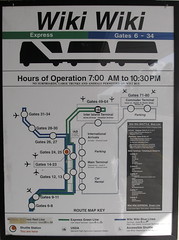 Image by Ross Mayfield via Flickr
Image by Ross Mayfield via Flickr
The paper specifically talks about how web2.0 is changing philanthropy. I'm thinking a lot about the question how working wikily is changing developing cooperation (we are starting an online discussion in Dutch here). Don't confuse philanthropy and development cooperation by the way! Philanthropy is the act of donating money, goods, services, time and/or effort to support a socially beneficial cause, with a defined objective and with no financial or material reward to the donor. Development cooperation is slightly more complex has to do with empowerment, social change, economic development and is also a political process.
Nevertheless there is a great example in the paper from philanthropy that demonstrates a new way of working and thinking that may inspire because grants are part and parcel of the development industry. The Case Foundation, launched the "Make It Your Own' Awards People could submit ideas for improving their communities, be reviewers and then vote for the best ideas to fund. They did build in a sort of control system. An open group selected the top 100 ideas, but advisors selected the 20 grant recipients according to the foundations goals and criteria.
If the development budget of the Dutch ministry would partly be allocated by a similar process, you would get a very different dynamic than the bureaucratic process it is currently. I liked the mixed approach, because I also believe in expertise and don't think you can make every process a democratic decision-making process. But the development budget is tax money, so it would give citizens some influence on how that money is spent.
Nice experiment or dangerous?

![Reblog this post [with Zemanta]](http://img.zemanta.com/reblog_e.png?x-id=c9d74d0c-d271-4c16-9951-e62b07c987ef)
No comments:
Post a Comment